Related Research Articles
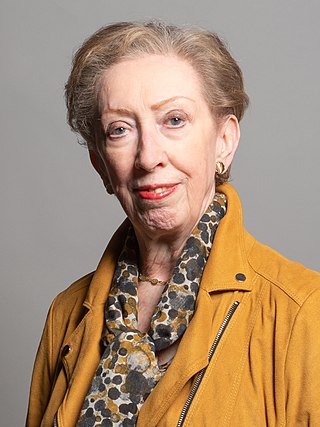
Margaret Mary Beckett, Baroness Beckett,, is a British politician. She was a Member of Parliament for more than 45 years, from 1983 to 2024. A member of the Labour Party, she was the United Kingdom's first female Foreign Secretary, and served as a minister under Prime Ministers Harold Wilson, James Callaghan, Tony Blair and Gordon Brown. Beckett was Deputy Leader of the Opposition and Deputy Leader of the Labour Party from 1992 to 1994, and briefly Leader of the Opposition and acting Leader of the Labour Party following John Smith's death in 1994. A member of the Labour Party, she served as Member of Parliament (MP) for Lincoln from 1974 to 1979, and for Derby South from 1983 to 2024. Her 45 years in the House of Commons makes her the longest-serving female MP in British history, her tenure as MP is shared with Baroness Harman who was an MP for 40 years. She became a member of the House of Lords in 2024.
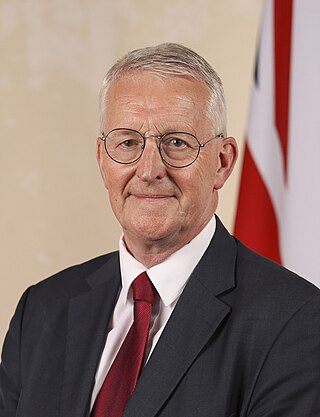
Hilary James Wedgwood Benn is a British politician who has served as Secretary of State for Northern Ireland since 2024. A member of the Labour Party, he has been the Member of Parliament (MP) for Leeds South, formerly Leeds Central, since 1999. He previously served in various ministerial positions under Prime Ministers Tony Blair and Gordon Brown from 2001 to 2010.
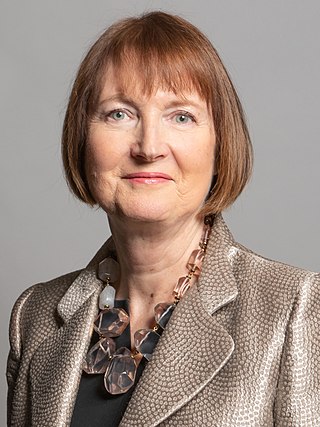
Harriet Ruth Harman, Baroness Harman,, is a British politician and solicitor. She was a Member of Parliament (MP) for more than 40 years, from 1982 to 2024, making her one of the longest-serving MPs in British history. Harman was MP for Camberwell and Peckham from 1997 to 2024 and MP for Peckham from 1982 to 1997. A member of the Labour Party, she was Deputy Labour Leader and Chair of the Labour Party from 2007 to 2015, and also served as Leader of the Opposition from May to September 2015. She served in various Cabinet and Shadow Cabinet positions. She became only the second longest-serving female MP after Baroness Beckett who served as an MP for more than 45 years. She has been a member of the House of Lords since 2024. Also In 2024 Harman began to Co-host the Sky News podcast Electrical Dysfunction alongside Political Editor Beth Rigby and former Scottish Conservatives Leader Baroness Davidson.
The Socialist Campaign Group, also simply known as the Campaign Group, is a UK parliamentary caucus of the Labour Party including Members of Parliament in the House of Commons. The group also includes some MPs who formerly represented Labour in Parliament but have had the whip withdrawn or been expelled from the party.
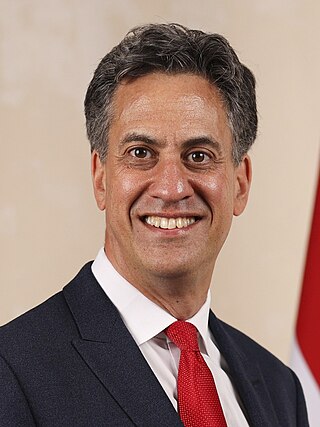
Edward Samuel Miliband is a British politician who has served as Secretary of State for Energy Security and Net Zero since July 2024. He has been Member of Parliament (MP) for Doncaster North since 2005. Miliband was Leader of the Labour Party and Leader of the Opposition between 2010 and 2015. Alongside his brother, Foreign Secretary David Miliband, he served in the Cabinet from 2007 to 2010 under Prime Minister Gordon Brown.
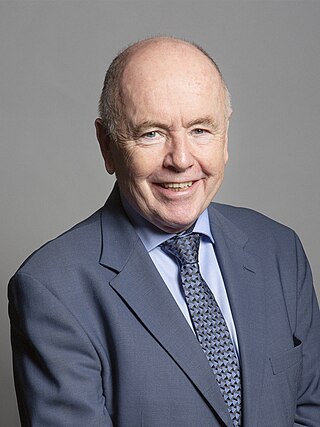
John Eugene Joseph Dromey was a British politician and trade unionist who served as Member of Parliament (MP) for Birmingham Erdington from 2010 to 2022. A member of the Labour Party, he served as Deputy General Secretary of the Transport and General Workers' Union and later Unite from 2003 to 2010.
Peter Martin Watt was the General Secretary of the Labour Party in the United Kingdom from January 2006 until he resigned in November 2007 as a result of the Donorgate affair. Watt was then a member of the National Society for the Prevention of Cruelty to Children (NSPCC) Executive Board. He is now working for Hammersmith council directing all services relating to children.

Labour Friends of Israel (LFI) is a group in the Parliament of the United Kingdom that advocates a strong bilateral relationship between the United Kingdom and Israel, and seeks to strengthen ties between the British Labour Party and the Israeli Labor Party. LFI says it supports a two-state solution to the Israeli–Palestinian conflict, with Israel recognised and secure within its borders, and the establishment of a viable Palestinian state. As of July 2020, it comprises around one quarter of the Parliamentary Labour Party and one third of the Shadow Cabinet.
The Cash-for-Honours scandal was a political scandal in the United Kingdom in 2006 and 2007 concerning the connection between political donations and the award of life peerages. A loophole in electoral law in the United Kingdom means that although anyone donating even small sums of money to a political party has to declare this as a matter of public record, those loaning money at commercial rates of interest did not have to make a public declaration.

The Deputy Leader of the Labour Party is the second highest ranking politician in the British Labour Party. The Deputy Leader also serves as the Deputy Chairperson of the Labour Party, and acts as Leader in the House in events where the leader cannot.
The 2007 Labour Party deputy leadership election was a British political party election for the position of deputy leader of the Labour Party. John Prescott, the previous deputy leader, announced on 10 May 2007 that he was standing down from that position and that he would be leaving as deputy prime minister about the same time that Tony Blair tendered his resignation as prime minister.
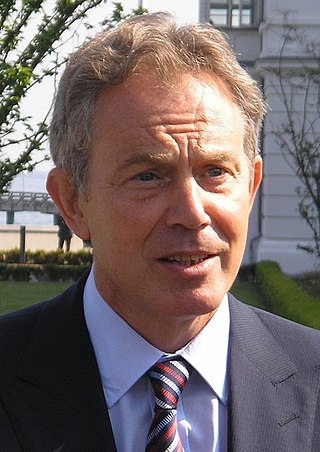
This is a timeline of events relating to the final years of Tony Blair's tenure as Leader of the Labour Party and prime minister and the leadership elections to find replacements for him and Deputy Prime Minister John Prescott, from his announcement that he would not lead Labour into a fourth general election, concluding with Gordon Brown becoming prime minister.

Gordon Brown formed the Brown ministry after being invited by Queen Elizabeth II to form a new administration following the resignation of the previous prime minister of the United Kingdom, Tony Blair, on 27 June 2007. Brown formed his government over the course of the next day, with Jacqui Smith being appointed the United Kingdom's first female home secretary.
Jonathan Neil Mendelsohn, Baron Mendelsohn is a British lobbyist and Labour political organiser. He was appointed the Director of General Election Resources for the party in 2007.

Ed Miliband became Leader of the Labour Party and Leader of the Opposition upon being elected to the former post on 25 September 2010. The election was triggered by Gordon Brown's resignation following the party's fall from power at the 2010 general election, which yielded a Conservative–Liberal Democrat Coalition. Miliband appointed his first Shadow Cabinet in October 2010, following the Labour Party Shadow Cabinet elections. These elections were the last such elections before they were abolished in 2011.
The 2007 Labour Party leadership election was triggered on 10 May 2007 by incumbent leader Tony Blair's announcement that he would resign as leader on 27 June. At the same time that Blair resigned, John Prescott resigned as Deputy Leader, triggering a concurrent election for the deputy leadership.
Better Together was the successful campaign for a No vote in the 2014 Scottish independence referendum, advocating Scotland continuing to be part of the United Kingdom. The organisation was formed in June 2012, operating until winning the vote on the referendum's polling day on 18 September 2014 with 2,001,926 (55.3%) voting against independence and 1,617,989 (44.7%) voting in favour. In June 2014, the campaign adopted a No Thanks branding, in relation to the referendum question.
The 2015 Labour Party deputy leadership election was triggered on 8 May 2015 by the resignation of Harriet Harman as Deputy Leader of the Labour Party of the United Kingdom following the party's defeat at the 2015 General Election. Harman, the Deputy Leader of the Labour Party, became Acting Leader following Leader Ed Miliband's resignation. Harman announced on the same day that she would step down as Deputy Leader, with her resignation taking effect when the new Leader and Deputy Leader are elected.

Harriet Harman's second Shadow Cabinet was formed by Harriet Harman in 2015 during her second period as Acting Leader of the Labour Party. She assumed this role after Ed Miliband resigned as party leader and announced she would continue until a new leader was elected on 12 September 2015. Miliband's resignation followed the party's defeat at the 2015 general election.

Woman to Woman, known in the media as Harriet Harman's Pink Bus, was a political campaign in the United Kingdom for the Labour Party at the 2015 general election. It was led by Deputy Leader of the Labour Party Harriet Harman, and involved a pink battle bus visiting marginal constituencies, promoting Labour policies and rallying support among female voters. It was described by Labour as the party's "biggest ever women's campaign". The Pink Bus was criticised in the media as "sexist and patronising".
References
- ↑ "CPS decides no charges over Labour Party donations". Crown Prosecution Service. 7 May 2009. Archived from the original on 19 May 2009. Retrieved 10 May 2009.
- ↑ Alex Barker and Jim Pickard (7 May 2009). "Prosecutors drop Labour donations probe". Financial Times . Retrieved 10 May 2009.
- ↑ Isabel Oakeshott (10 May 2009). "'Brutal' Brown sacrificed party chief". Sunday Times . London. Retrieved 10 May 2009.[ dead link ]
- 1 2 3 Property developer was Labour donor Metro.co.uk – 25 November 2007
- ↑ Independent on Sunday , 2 December 2007
- ↑ Property developer was Labour Donor The Sunday Express – 25 November 2007
- ↑ Daily Telegraph 28 November 2007, p. 1
- ↑ Gordon Brown says Labour donations 'illegal' The Daily Telegraph 28 November 2007
- 1 2 Harman took cash 'in good faith' BBC News – 27 November 2007
- 1 2 Labour donations to be returned BBC News – 27 November 2007
- ↑ "Hain admits more donations errors". BBC News. 3 December 2007. Retrieved 7 May 2010.
- ↑ "Abrahams makes proxy donor claim". BBC News. 1 December 2007. Retrieved 7 May 2010.
- ↑ Alexander quits as Labour leader, BBC News Online, 28 June 2008